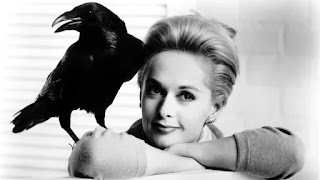Released 60 years ago today, on March 28th, 1963, the enduring greatness of Alfred Hitchcock's The Birds lies foremost in its still impressive technical proficiency. This is a movie that would be largely accomplished via CGI today but in 1963, aside from working with actual birds in many scenes (including the brutal final assault on Tippi Hedren), Hitchcock had to call upon on an array of practical techniques - ranging from prop birds made from papier-mache (mechanical birds proved to be unusable) to matte paintings (courtesy of the famed Albert Whitlock) to optical effects (supervised by former Disney animator Ub Iwerks, who performed such tricks as optically multiplying the number of birds in a scene through double, triple and quadruple printing shots) - in order to portray its avian terrors. It may have lost the Oscar for Best Visual Effects to Cleopatra but it's the FX of The Birds that still retain the ability to dazzle.
Beyond its technical virtuosity, the power of The Birds lies in its enduring ambiguity, This is a vision of the end of the world that resists easy interpretation. Not only did Hitchcock and screenwriter Evan Hunter refuse to provide an explanation for the bird attacks (although Hitchcock did say to Cinefantastique magazine in a 1976 interview that rabies was the cause in his mind, equating the birds' behavior to that of information he read of rabies-affected bats in Carlsbad Caverns in New Mexico) but it's a film that resists metaphorical interpretation as well. What the birds might represent in The Birds remains anyone's guess, even six decades later.
Are they supposed to echo modern fears of nuclear destruction, symbolizing "death from above?" I think that's a hard case to make, which is probably why few have seriously tried to. Unlike many other films from that era, The Birds is a movie that has remained immune from that sort of glib atomic age reading. Whether or not director Don Siegel intended the pod people of 1956's Invasion of the Body Snatchers to be seen as a metaphor for the Red Scare of the '50s and the creeping paranoia of McCarthyism, that didn't stop critics from perceiving that message in his film. But The Birds has steadfastly resisted allegorical interpretations. It's the end of the world but with no overt comment on what it all means.
Nearly every nature gone amok/eco-horror film that was inspired by The Birds - everything from Frogs (1972) to Kingdom of the Spiders (1977) - felt obliged to provide some sort of ecological rationalization for the natural world turning against man. But Hitchcock believed that such prosaic explanations were, well, for the birds. The why of what's happening doesn't matter. It only matters that it is happening. The Birds is pure cinema, a series of unprecedented technical challenges that Hitchcock posed for himself to overcome.
If it were just the end of the world that Hitchcock was interested in, he could have told any kind of apocalyptic tale he wanted to, he could have concocted any kind of conventional doomsday scenario if all he wanted to do was send some kind of message about the state of the world, a warning about the future, or to just tell a story about how people might face the unraveling of society. He chose Daphne du Maurier's 1952 short story to adapt not because of whatever the notion of birds turning against man might mean symbolically but because of what they would mean cinematically. It was about the specific challenges that using birds would entail from a movie making perspective. Having Bodega Bay invaded by, say, aliens? Oh, that's easy. But birds? Well now you've made it hard on yourself. While there are genuine emotional layers to be found in The Birds thanks to the cast all delivering sensitive, empathetic performances, the greatest statement it makes is about Hitchcock's desire at such a late stage in his career, when he had nothing left to prove, to task himself harder than he ever had.
What, if anything, Hitchcock was trying to say about humanity with The Birds is debatable. What he was saying about himself as a filmmaker is undeniable: that he was the best in the game.







No comments:
Post a Comment